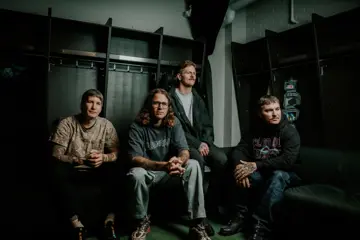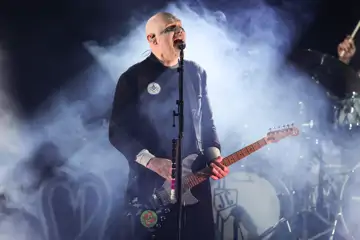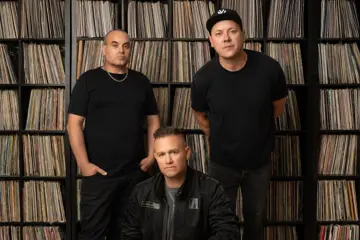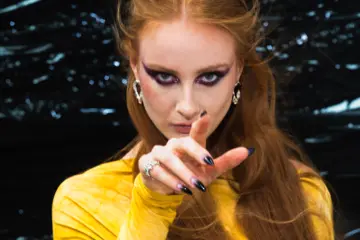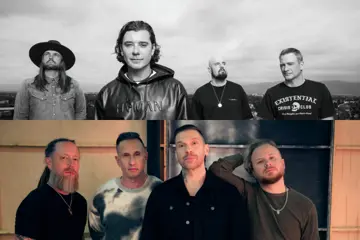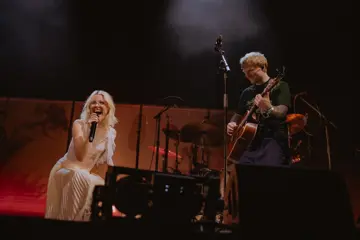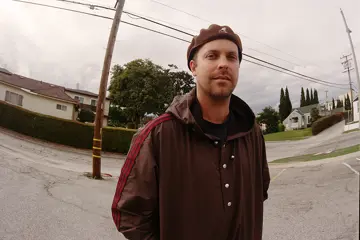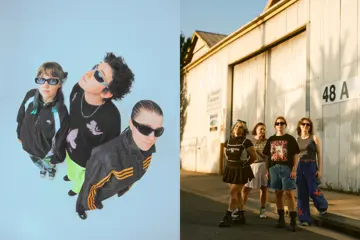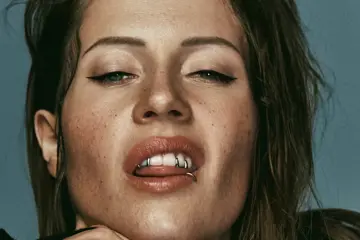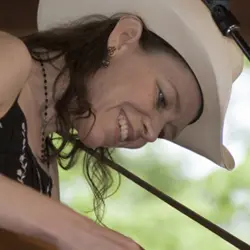 Gillian Welch
Gillian WelchThey say that from little things big things grow, and that certainly seems to have been the case in the fertile world of Gillian Welch and Dave Rawlings. The pair have long been revered in the Americana scene for their authentic fusion of the Appalachian, bluegrass and country music forms, their incredible duet work and the unparalleled creative simpatico that they share together — they were recently bestowed with the Lifetime Achievement Award For Songwriting by the Americana Music Association — but in recent years both their muse and creative potential have expanded significantly in strange and wonderful ways.
Having always released their duet work under the Gillian Welch moniker — with Welch taking centre stage vocally, allowing Rawlings to focus on harmonies and his virtuosic guitar work — in 2009 they released an album A Friend Of A Friend with some musical comrades under the banner of Dave Rawlings Machine, with the titular Rawlings taking the vocal reins and the spotlight (to a degree).
"I get to sing higher! Dave's got a pretty high rock'n'roll voice, and we often laugh that his range is pretty much just one step below mine."
This expansion seemed to really offer the pair new scope in their endeavours and since then they've alternated between the two incarnations — in 2011 they released the fifth Gillian Welch record The Harrow & The Harvest, and then this year the second Dave Rawlings Machine album, Nashville Obsolete, followed. To top off this beautiful new duality they're even conducting their second Australian tour — and first for 11 years — in both guises, driving from Perth to Brisbane playing under the Gillian Welch banner and then adding some members and turning straight around to do it all again as Dave Rawlings Machine.
"It's just a different incarnation," Welch smiles. "I get to sing higher! Dave's got a pretty high rock'n'roll voice, and we often laugh that his range is pretty much just one step below mine — if I sing a song in D he would sing the song in C — so for me to get above him and be singing tenor all night, if anyone's ever wanted to see how high I can sing then they should definitely come to the [Dave Rawlings] Machine show.
Don't miss a beat with our FREE daily newsletter
"But other than that I guess we play a little louder and a little faster with the Machine — and we need a bigger car — but we write the songs in pretty much exactly the same way. We made the record in pretty much exactly the same way in the same studio with the same mics. This is the first Machine record that we made the way we make our duet records. I feel like the two things are converging, but it kinda does some good stuff for us to have two different entities — it gives us a little more freedom to experiment and try different things.
"Like a song like Ruby [from A Friend Of A Friend] believe it or not — even though it's sung to a chick — Ruby was actually started without knowing who it would be for, but it very quickly seemed like it would be a good fit for Dave. But it wasn't actually started for Dave, whereas every song on Nashville Obsolete was started for Dave to be the singer. They're a little more tailor-made. But the process is the same. Most of the time I start them but sometimes Dave starts them, or he'll have an idea for a chorus and I'll go in and start writing the verse that goes into the chorus. Or sometimes I'll write the whole thing and Dave will get involved polishing it up, like an editor and an arranger. Or sometimes Dave will start the whole thing. It really has become a really good writing team — I think we've really grown into a fully-fledged writing team.
"So I don't know, it was really nice — even though it felt premature — to get the recognition of the Lifetime Achievement Award. It was really nicely timed. Even though Dave and I joke about it being a 'Mid-Lifetime Achievement Award'," she chuckles. "Nonetheless it was really a nice moment to be recognised as a team, because I feel that we've never been so publicly a team as much as we are now.
"When we were starting out we came out of Nashville and I was the primary writer, and Nashville is such a writer-centric town and Dave had never really written until he started writing with me, so we were 'Gillian Welch' — the band was 'Gillian Welch' because I was the writer. But now the band literally is 'Gillian Welch' — we actually officially are a band. With the Grammys if you look up on the ballot it says 'Gillian Welch is a band composed of Gillian Welch and David Rawlings'. Just so you know, Gillian Welch is officially a band."
"Dave and I joke about it being a 'Mid-Lifetime Achievement Award'..."
Rawlings, for his part, believes that they still tend to just let the songs take the pair where they will, even if the tracks for Nashville Obsolete started out with a nudge in the Dave Rawlings Machine direction. If anything he seems pleasantly surprised that people want to hear and see him leading his band at all.
"We tend to get started, when we're working on material, we'll get songs and as they start to take shape they usually dictate a lot of the decisions that get made," he reflects. "In this case, even the fact that we made a Machine record that was driven by a couple of factors: one was that we went out last year and did some touring domestically in the States with [legendary Led Zeppelin bassist] John Paul Jones, who was playing mandolin with us, and we just decided to do some Machine dates and JPJ had time so we had a nice quintet there.
"And we'd made the one record in 2009 and we were really interested to see and hear five years later that we were playing to bigger houses and the record really seemed to have really sunk in. We had a really good time playing and a lot of people came out and I don't really read my own press but Gill looked at some stuff and the reviews for the shows were fantastic. So that put us in mind of maybe doing another Machine project, and it just happened that a couple of songs got finished that seemed like we were interested in having me be the lead [vocalist] on 'em, so we thought, 'Well let's just sort of push ahead with that and look at these other songs we're working on and maybe try and aim them that way'.
"Sometimes you only get so far — I mean there was material that we were working on that didn't make this record that we'll probably end up using for a Gillian record — but we tried to gently guide it in that direction. I think of it sometimes as: you're on this journey — you're in a boat or something — and you can't really see where you are, it's cloudy and you can't see the stars, you don't know which way the current's going and you're kind of paddling in a general direction, and then as you sort of make headway once in a while you sort of get to read the stars and figure out, 'Okay, we are going north, we're going in the direction I thought,' or you're going, 'Well we're going west so let's try to turn it around this way,' or maybe you just decide to go somewhere else. I always find it funny that it can be smooth or it can be rough to go in the direction you want, but you've only got so much control over it and if you try to have too much I think it tends to squash the creativity and things don't come out so well. So you have to be open to a certain amount of it, and you also have to have a little bit of intention or you do tend to just paddle in circles, and maybe you don't ever get anywhere that you like."
Rawlings agrees that it is something of a luxury having this choice to paddle in different directions.
"Once we started playing this way a little bit we really enjoyed it, because we've made so many musical friends over the years and we have a deep love of playing as a duet and always did. Even starting out in Nashville before we'd sold a record or played outside of Nashville we had plenty of offers from people who maybe wanted to play bass with us, or try to sort of expand what we were doing, but we were very dedicated to this sound of two instruments and two voices and what you can do with that. But after we'd done that for a long time it was also really refreshing and brought things back to the duet to get to play with the great people we've been able to have — I mean I always say that everyone who's ever played with us is vastly over-qualified," he laughs. "So when we get to go out and do something like the touring this year with Brittany [Haas] who's just a masterful fiddler and Paul Kowert who's just one of the greatest bass players around and can bow his bass and his arco work is incredible — plus with Willie [Watson] I would tentatively rank myself the third best lead singer in the group.
"But the harmony work is also really fun, I mean the fact that we get to sing three-part or four-part harmonies — as we're nuts about singing harmony — that's a great luxury and a pleasure. And to go through your whole life not doing that, we'd both hate that, so it's a great thing to be able to sort of switch back and forth. And the songs drive it more than anything else so we just go where they lead, but it is nice over the years — in the early part of our career when we were just making duet records there was material that we wrote that we would sometimes have other people cut or sometimes it would just get set aside in a drawer because it wasn't exactly right for what we were doing. But sometimes it wasn't that they were bad songs, it's just that they didn't fit — they would have stuck out and changed the artistic statement of whatever project we were working on. And now the songs have maybe, I don't know whether it's twice the chance but it's maybe one-and-a-half times the chance of finding a home."
"I do sort of know what the tools in my toolbox do. Kind of."
It's fascinating to hear Welch's take on songwriting: she majored in the artform at Berklee College Of Music in Boston (fortuitously also where she met Rawlings) and has, for decades, made crafting these authentic, old-school songs seem like the easiest thing in the world, but she's fairly adamant that it's not something that's meant to get easier over time.
"I don't know, man," she ponders. "I was speaking to [US radio personality] Garrison Keillor about this — I've loved Garrison forever, I've been a big fan of his and he's been a big supporter of ours over the years, and I really value him as a writer and a man who every week writes a ten-minute monologue that he reads on the air. In my mind he's a writer first and foremost — even though he's a radio personality, he's a writer — and we were on there one time doing A Prairie Home Companion and I was frustrated, we were frustrated, and we hadn't made The Harrow & The Harvest yet, we'd been writing songs for years and we didn't like 'em — we kept writing songs and we didn't like them — and I remember talking to him and I kinda spilled my guts. He was, like, 'How's it going, are you working on a new record?' and I probably screamed. I love people who give it to you straight and don't feel the need to say something rosy, and what Garrison said was, 'Well, anyone worth their salt knows that it only gets harder'. I really was, like, 'Amen, brother! Thanks for that, because that's how it's been feeling! It's been feeling like it's fully been getting harder.'
"And there is some truth in that for a lot of reasons — we could talk for two hours about why it only gets harder. It gets harder because you second guess yourself. And it gets harder because to some degree your natural impulses — the stuff that comes naturally to you — you've already done it. So what do you, do you do it again or do you do something different? It gets complicated, but I will say that there is some command of the craft at this point. I do sort of know what the tools in my toolbox do. Kind of. So maybe it balances out, I dunno.
"The best thing I will say is that through all of it my mind is the same mind — I still see the same things and have the same love of language in my brain, and I don't feel any disconnection and I'm certainly not cynical. I'm still excited about it, and I'm still trying to write songs that if I end up in a song swap with Bob Dylan I wouldn't want to slit my wrists. That's where it always is, that's where it's always been, and I'm still hoping that if that day should ever come I'll be able to eke out at least a couple back and forth and it would be okay. Orphan Girl [from 1996 debut album Revival]? Okay there's one, check! Orphan Girl, I've got no apologies for Orphan Girl it's a fine song. But that's how things go around here when we're working, we're just trying to make it so that they're not embarrassing and they hold up.
"I sometimes don't think that people understand that we're problem solving — we're constantly problem solving. How are we going to get this song across?"
"Other than that I sometimes don't think that people understand that we're problem solving — we're constantly problem solving. How are we going to get this song across? It's problem solving, problem solving, and to a certain degree if something solves the problem we'll take it, we'll do it. We happen to work in a very focused manner — I feel that most of our work is fairly cohesive — but I feel like we would venture in another direction in a second if it solved one of our problems. We're actually very, very open-minded and very aesthetically flexible. We're very open to all kinds of stuff — you wouldn't believe what we've got in our record collection! It's all over the place and I love all of it, it's just that when we get down to working we tend to solve our problems in the only ways we know how and that's what tends to give our work this continuity — it's not intentional, it's just the only way we know how to do it! Our records sound the way they sound because it's the only way we know how to do it — to work on tape, to record live. I have no idea how you make a sonically pleasing record with overdubs, I honestly don't know how to do it, but I do know how to set up on a room with all the mics on at one time and capture the sound that is mixing in the air — that's what we do."
And this problem-solving methodology reared its head on Nashville Obsolete, only in a manner never before explored in depth by the partnership.
"I really dig the strings on it," Welch continues. "I feel like that was a really nice addition, and it was the first time that Dave has ever arranged strings and I think there will probably be a little bit more of that in our future. We both found it to be really great — fun, challenging, and a new problem-solving device. Strings! They solved some problems so we might do some more of that.
"And we're really enjoying playing with this band right now, we're still figuring out what this band could do. When we hit the road all we could play together was [epic Nashville Obsolete song] The Trip — The Trip was the only song we'd ever played with this band altogether before we started this six-week tour! So it's been really exciting to hear what we can do — we're still learning what this band can do — and by the time we hit Australia we'll have another three weeks under our belt here."
There's certainly a lot of love for the joint tour, especially given that the pair last performed here in 2004 (as Gillian Welch). That tour was critically acclaimed — and seemingly enjoyed equally well by the artists — but it seems that the logistical necessities involved with conquering Australia's tyranny of distance (ie. the long plane flights to get here) may have something to do with this extended absence.
"I feel bad because I've never gotten along with flying very well at all and we tend not to [tour Australia]," Rawlings guffaws. "We haven't flown very much for years — I think in 2011 or 2012 we took one flight to Dublin and then we toured in Europe and then left from Stockholm or something and flew home, and those were the only airplanes for years. We haven't flown anywhere since.
"I've always wanted to see that road between Perth and Adelaide, and I don't know whether we're going to have the time to get up to that rock..."
"But we had such a great time [in Australia in 2004] and it was such a great high-water mark in our lives getting down there and playing that tour, the response was really memorable. Because we didn't really know what to expect the first time that we went. In fact when we decided to go again we didn't know — even the people we were working with, nobody was really sure if people would still be interested in us coming down or whatever; we just didn't know what was going to happen and thus far we've been really pleasantly surprised. I'm very happy, and it just sounds like people are as excited as we are, which makes for some really fun shows.
"And I'm so excited to be driving the whole country, which is something I've always been interested in doing. I've always wanted to see that road between Perth and Adelaide, and I don't know whether we're going to have the time to get up to that rock but we do so much driving here in the States. You'll get somewhere and it's evening or it's morning and the light will just be beautiful and you'll be at these places where you just want to get out and film wherever you are — you just can't believe how beautiful it is — and it happens in different places every time you make these drives. The country is so beautiful and Australia was so beautiful when we drove it last time. I love that open space."
Welch concurs that driving such massive distances is par for the course for the couple — they just racked up 9,200 miles through the States on the first leg of the Nashville Obsolete tour — and that she, too, can't wait to see our wide-open spaces.
"Dave and I really like the fact — and I don't know whether it's bravado or what — but we really like doing our own driving," she giggles. "It affects my whole sense of what we're doing, the fact that no one is dragging me around. Do you know what I mean? It's sort of a profound difference — I don't have to show up to bus call and have someone drag my ass to another city. No, I want to go to the next city — in fact I'm doing my own driving! So yeah, we're very excited to be coming back down there finally. We've talked for years about bringing both bands down there and doing this wild back-to-back circus, so I'm really excited that this is what's happening. We're so looking forward to it, it's going to be a big old time.
"I love that we sort of stubbornly arrested our thing of, 'No, we're going to tour the way we always tour.' And they were, like, 'You can't,' and we were, like, 'Yes we can!' We've been excited about this and waiting for the opportunity to come back down, because that one tour we did before really made a mark in our world — it was burned into our memories — so we've been looking forward to it, and the initial reaction from you all shows that it's reciprocal. I think it's going to be great. We're going to cram as much in as we can — do as many shows as we can. We're looking at it as a big rolling circus, and everyone is super-excited and just ready to give it everything we've got. And it's a really good group of people that we'll be coming down with, it's going to be a whole event and that's how it should be."



